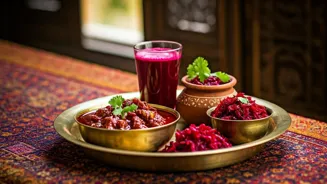Beetroot, the vibrant root vegetable, is often touted for its health benefits. But is it truly a universal dietary hero? A doctor unpacks the surprising
truths about beetroot consumption, tailored for the Indian context.
Beetroot: The Basics
Beetroot, with its earthy sweetness, is packed with nutrients. Rich in antioxidants, vitamins, and minerals, it promises to boost energy and overall wellness. From beetroot poriyal in the South to beetroot paratha in the North, it's a familiar ingredient in many Indian kitchens.
The Health Benefits
Beetroot helps lower blood pressure, thanks to nitrates that relax blood vessels. It enhances athletic performance by improving oxygen use. Plus, the fiber aids digestion. Remember the beetroot halwa your grandma always insisted on? Turns out, she knew best!
Potential Side Effects
While generally safe, beetroot can cause beeturia (red urine). It might also trigger digestive issues for some. Individuals prone to kidney stones should be cautious due to its oxalate content. Always consult a doctor if you have underlying health conditions.
Beetroot for Indians
In India, where dietary habits vary widely, it's essential to consider individual health profiles. Those with diabetes or kidney problems should consult their doctors before adding beetroot to their routine. A balanced diet incorporating a variety of foods is the key.
Enjoying Beetroot Safely
To enjoy beetroot safely, start with small portions. Pair it with calcium-rich foods to mitigate oxalate effects. And most importantly, listen to your body. If you experience any discomfort, reduce intake. Enjoy your beetroot, but with awareness!















